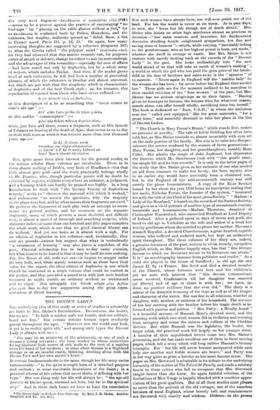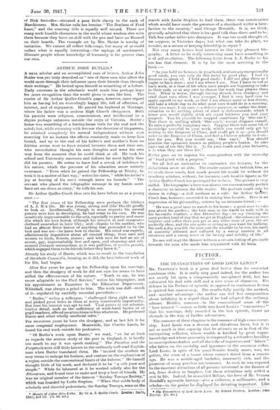THE DEVOUT LADY.* Txr underlying idea of this study or
series of studies is admirably set forth in Mrs. Sluine's Introduction. Devoutness, she insists, has no sex. " In faith is neither male nor female, wed nor celibate, bond nor free." But certain definite human types resolutely persist throughout the ages. " However new the world may look, it yet is in reality quite old," and among such types the Devout Lady is always with us :-
" She may be an aristocrat of the aristocrats, or one of such a woman's young servants : the busy worker to whose meticulous loving-kindness look scores of sick souls as the eyes of a maiden unto the hand of her mistress ; or some silent woman in a Highland cottage or on an invalid couch, thinking, dwelling alone with the Divine Fact and her own mystic's heart."
In certain fundamentals she is the same, though her life-story varies immeasurably—" in the quiet strength born of a detached purpose and outlook ; in some inevitable limitations of the &that ; in a personal scheme of life-values that never shifts, if differing with her type." But one thing only her life will always be : " the age-old journey of Divine quest, crowned not here, but far in the spiritual city." And in these dark hours we have at least the consolation • The Devoid Lady : a Study in Four Centuries, By Mary I. 11. Sedge., fosadoe: Constable and Co. tau. net•i that such women have always been, nor will ever pariah out of the land. For her the world is never at its worst. As in past days,
so now, she " loves her life though not of death afraid." Mrs.
Shrine also insists on other high attributea almost as precious as devotion—" her calm reserves and braveries, her fundamental decencies dwelling beside enlightened sympathies, her fine and saving senseof humour "—which, while varying, "inevitably belong to the gentlewoman, who at her highest power is born, not made," whether she dwell in cottage or castle. But Mrs. Shrine is not content with merely looking back at the records of the " Devout Lady " in the past. She looks unflinchingly into " the new world ahead of us that will take so much of woman's making " ; a world in which the girl who has paid the grim price of the battle- field in the loss of brothers and mate-to-be is the " spinster " of to-morrow. " Never again in England will the ' maiden lady' be the woman she has been ; for never before has England thus needed her." These girls are for the moment inclined to be merciless in their candid criticism of the " lone woman " of the past, but Mrs. Skrine has no serious misgivings as to their future. " Having given no hostages to fortune, the woman who, for whatever reason, stands alone, can offer herself wholly, sacrificing none but herself." The book is dedicated to " Joan, V.A.D.," in whom the authoress sees one " called and equipped," like her great namesake, " for a great hour," and assuredly destined to take her place in the lice of Devout Ladies.
" The Church in Mary Ferrar's House," which stands first, makes no pretence at novelty. The tale of Little Gidding has often been told, but, as Mrs. Skrine reminds us, almost invariably with eyes set on the male portion of the family. Her aim is to raise into due pro- minence the service rendered by the women of three generations— Mary Ferrer, her daughter, and her granddaughters, notably Mary Collet. She admits the magic of John Inglesant, but deprecates the liberties which Mr. Shorthouse took with " this gentle saint, her simple life and its true records." It is only in the latter pages of the study that Mrs. Skrine gives us her estimate of one who needed no aid from romance to make her lovely, the born mystic, who in an earlier day would have inevitably been a cloistered nun, but in the England of the mid-seventeenth century was still merely the pious housemistress. A copy of the Etzcior BarrOurr) bound by her about the year 1050 bears an inscription stating that her uncle, Nicholas Ferrar, the founder of the system, " honoured her with the title of the Chief of his most pious Society." " Madam : a Lady of the Moorland," is based on the records of the Surto es Society, and gives us a vivid portrait of another typo of seventeenth-century housewife and housemistress—Madam Thornton, daughter of Christopher Wandesford, who succeeded Strafford as Lord Deputy of Ireland. After a girlhood spent in days of storm and peril, she lived to old age in Yorkshire as the wife and widow of a weak but worthy gentleman whom she married to please her mother. She was a staunch Royalist, a devoted Churchwoman, a great-hearted, capable woman, who suffered and endured much, but kept an undaunted spirit throughout. The three volumes of her diary are, indeed, a genuine document of the past, written in vivid, homely, outspoken English which, as Mrs. Shrine happily says, has that " fine literary flavour to which no literature meant to be literature can attain." It is " an autobiography immune from publisher and reader." As a child she played in the house of Strafford ; in old age she saw James II. fly to France. She lived and died a devoted member of the Church, whose fortunes were hers and her children's, yet we note with interest that " this devout communicant never received Confirmation till her daughter was married [at fifteen] and of age to share it with her ; we have, in- deed, no positive evidence that she ever did." The diary is a mirror of the domestic economy of the time as well as of the temper and character of the writer. She was fine in all relations, whether as daughter, wife, mother, or mistress of her household. The account of her last meeting with her brother before his tragic death is in- formed with passion and pathos. " Mrs. Patty : a Mendip Annal " is a beautiful account of Hannah More's devoted sister, and the amazing work which two weak women did in civilizing and rescuing from savagery and crime the minors and colliers of the Cheddar district. But while Hannah was the legislator, the leader, the larger mind, the practical work fell largely on her younger sister. A number of their unpublished letters came into Mrs. Shrine's possession, and she has made excellent use of them in these moving pages, which tell a story which will long outlive Hannah's literary. triumphs. For " her life will never become antiquated while men help one another and feeble women are brave," and Patty was in her way quite as great a heroine as her more famous sister. The paper on Mrs. Sherwood is admirable in its tribute to the underlying humanity of the author of The Fairchild Family, and reads a salutary lesson to those critics who fail to recognize that Mrs. Sherwood taught better than she knew. So again faithful criticism of the limitations of Miss Yonge is happily blended with a sensitive appro.
ciation of her great qualities. But of all these studies none pleases us more than the portrait of the old cottager, one of the nameless heroines of rure4. England, whose homely talk and reminiscences are flavoured with charity and wisdom. Diekens—in the person of Dick Swiveller—elevated a poor little slavey to the rank of Marchioness. Mrs. Slain calls her heroine " The Duchess of Ford Lane," and the courtesy title is equally well earned. There are many such humble (diameters in the world whose wisdom dies with them because they have no skill with the pen and have no Boswell on their hearth. The example set by Mrs. Skrine is worthy of imitation. Wo cannot all collect folk-songs, but many of us could collect what is equally interesting—the sayings of uneducated, illiterate people whose knowledge of humanity is far greater than our own.



































 Previous page
Previous page